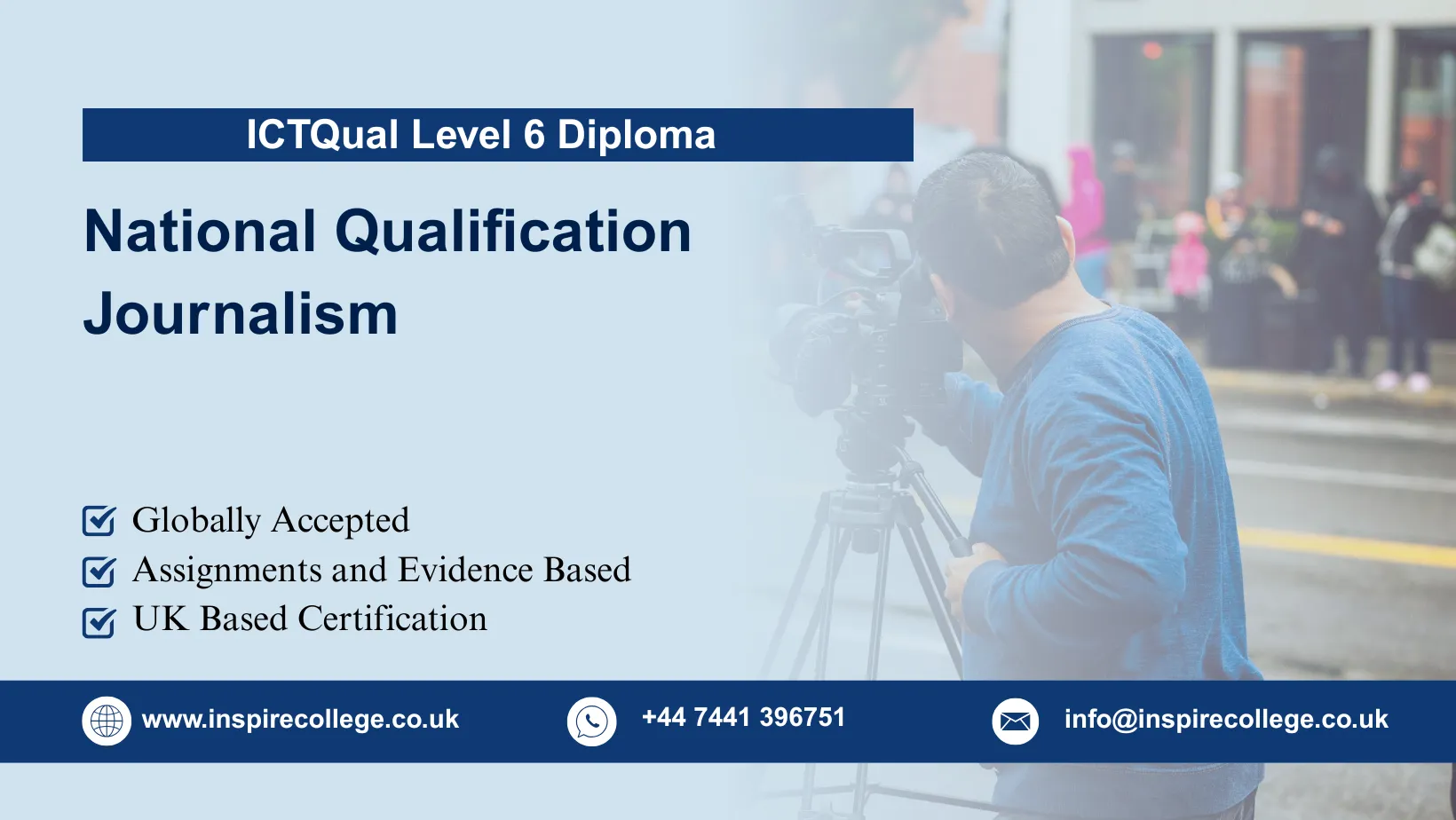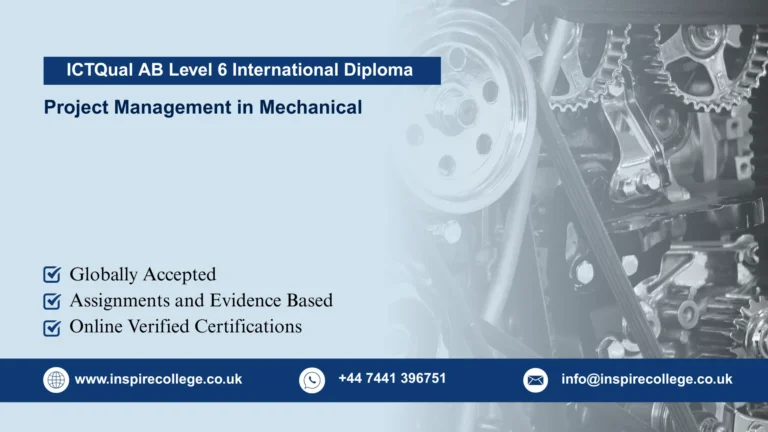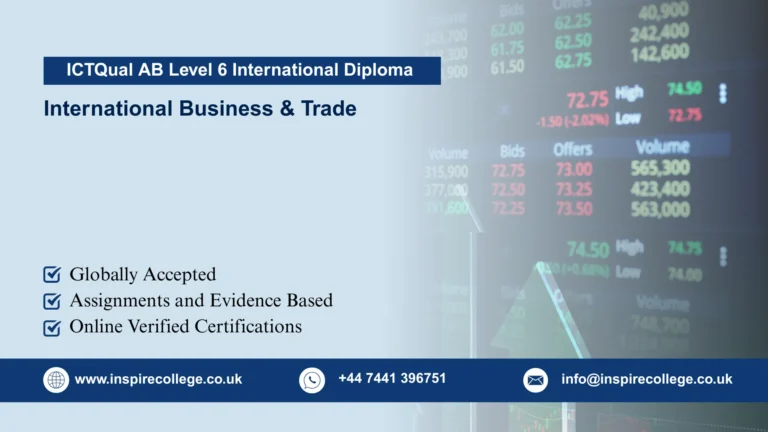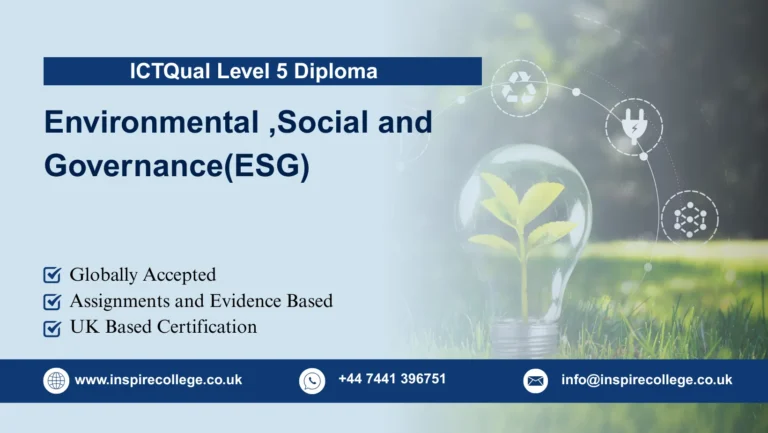
ICTQual Level 6 Diploma in National Qualification Journalism
The ICTQual Level 6 Diploma in National Qualification Journalism is designed for learners aiming to advance their careers in journalism and media. Whether you are new to the field or an experienced professional seeking to deepen your expertise, this internationally recognised qualification equips learners with advanced competencies in investigative reporting, editorial management, and digital media strategy. By combining practical training with industry insights, the programme ensures graduates are prepared for the dynamic demands of today’s media landscape.
This 60-credit diploma, structured across 6 specialised units, provides a comprehensive learning pathway in advanced news reporting, media law, strategic communication, editorial leadership, and multimedia journalism. Learners develop the ability to critically analyse complex information, produce high-quality investigative content, and manage editorial projects with confidence. The curriculum places strong emphasis on ethical journalism, critical thinking, and professional decision-making, enabling learners to uphold the highest standards of media practice.
Completing this diploma significantly enhances career prospects, opening pathways to senior roles in newsrooms, digital media agencies, investigative journalism units, and corporate communications departments. Key benefits include mastery of multimedia content creation, advanced investigative techniques, leadership and management skills within media organisations, and improved employability in competitive media environments.
Tailored to provide practical, real-world experience, the programme fosters analytical, creative, and technical expertise. With its strong focus on professional relevance and industry applicability, the ICTQual Level 6 Diploma in National Qualification Journalism empowers learners to achieve their career goals, excel in dynamic media settings, and contribute meaningfully to the field of journalism both locally and internationally.
To ensure learners can fully engage with the academic and practical requirements of this program, the following entry criteria are recommended:
- Age Requirement:
Learners must be 19 years or older at the time of enrollment. - Educational Background:
A Level 5 qualification (such as a Diploma in Journalism, Media Studies, or Communication) or an equivalent qualification in a related discipline is required. Candidates with substantial professional experience in journalism or media may also be considered. - Work Experience:
Prior experience in journalism, news writing, editing, broadcasting, or media production is highly desirable. This helps learners relate theoretical concepts to real-world media practices. - English Language Proficiency:
As the course is taught and assessed in English, learners should demonstrate proficiency equivalent to IELTS 6.0 or above (or an equivalent qualification). Strong English reading, writing, and speaking skills are essential for news reporting, editorial writing, and content production. - Technical Competence:
Basic knowledge of digital journalism tools, media editing software, and online publishing platforms is recommended to enhance practical learning outcomes. - Professional Attitude:
Learners should display integrity, creativity, critical thinking, and ethical awareness, reflecting the professional standards expected in journalism.
These requirements ensure that learners are well-prepared to analyze, produce, and manage complex media content, meet industry standards, and excel in national and international journalism environments.
Mandatory Units
This qualification, the ICTQual Level 6 Diploma in National Qualification Journalism, consists of 6 mandatory units.
- Advanced News Reporting and Analysis
- Media Leadership and Management
- Digital Media Strategies
- Media Law and Policy Development
- Investigative and Feature Journalism
- Strategic Communication and Public Relations
Learning Outcomes for the ICTQual Level 6 Diploma in National Qualification Journalism:
Advanced News Reporting and Analysis
- Develop advanced skills in news gathering, reporting, and analysis for diverse media platforms.
- Apply critical thinking to evaluate sources, verify facts, and ensure accuracy in reporting.
- Produce in-depth news stories and feature articles that demonstrate clarity and professionalism.
- Interpret complex data and information to present insightful news analysis.
- Tailor content for print, broadcast, and digital media audiences effectively.
- Enhance interviewing techniques for high-profile and investigative reporting.
- Apply ethical principles to maintain credibility and integrity in advanced reporting.
- Integrate multimedia elements into news content to engage audiences.
Media Leadership and Management
- Develop leadership skills suitable for managing editorial teams and media projects.
- Understand strategic planning and decision-making within media organisations.
- Apply effective newsroom management techniques, including workflow and resource allocation.
- Evaluate performance and implement continuous improvement strategies for teams.
- Manage conflicts and ethical dilemmas within a media environment.
- Develop project management skills for media campaigns and journalistic initiatives.
- Build the capacity to lead cross-functional teams in dynamic media settings.
- Enhance professional judgement in policy development and editorial oversight.
Digital Media Strategies
- Develop advanced strategies for digital content creation and audience engagement.
- Analyse social media trends to optimise content reach and interaction.
- Apply SEO principles to enhance visibility of digital journalism content.
- Integrate multimedia storytelling techniques, including video, audio, and graphics.
- Measure and interpret digital analytics to refine media strategies.
- Explore monetisation models for digital journalism and media platforms.
- Adapt content to emerging digital tools and technologies in journalism.
- Create compelling, platform-specific content that aligns with audience behaviour.
Media Law and Policy Development
- Apply advanced knowledge of national and international media laws in reporting.
- Develop policies that ensure legal compliance and ethical journalism practices.
- Analyse legal issues related to freedom of speech, defamation, and privacy.
- Evaluate regulatory frameworks and their impact on media operations.
- Assess intellectual property rights and copyright issues in journalism.
- Integrate legal considerations into investigative and editorial processes.
- Develop guidelines for organisational media policy and governance.
- Apply risk management principles to media and journalistic activities.
Investigative and Feature Journalism
- Conduct comprehensive research for investigative and feature journalism projects.
- Identify and verify credible sources while maintaining confidentiality.
- Apply advanced fact-checking and verification techniques for complex stories.
- Produce long-form investigative reports and feature articles with professional standards.
- Evaluate ethical considerations in investigative journalism practices.
- Integrate multimedia and data-driven approaches to enhance storytelling.
- Analyse real-world investigative case studies to apply practical insights.
- Develop critical thinking and problem-solving skills for in-depth reporting.
Strategic Communication and Public Relations
- Develop strategic communication plans for media, corporate, and public sectors.
- Apply public relations principles to enhance organisational reputation and messaging.
- Create and manage effective media campaigns across multiple platforms.
- Communicate complex information clearly and persuasively to target audiences.
- Manage crisis communication and stakeholder engagement effectively.
- Evaluate the impact of communication strategies through analytics and feedback.
- Integrate professional ethics and transparency into public relations practices.
- Develop advanced writing and presentation skills for professional media contexts.
The ICTQual Level 6 Diploma in National Qualification Journalism is designed for learners who want to advance their knowledge, skills, and professional competence in the field of journalism, media, and communication. This qualification is ideal for individuals aiming to work at a national or international level, producing high-quality, ethical, and impactful journalism across multiple media platforms.
This course is suitable for:
- Aspiring Professional Journalists: Individuals who want to develop advanced reporting, writing, and editing skills to work in print, broadcast, or digital media.
- Experienced Media Professionals: Working journalists and media practitioners who wish to upgrade their qualifications and gain formal recognition for their industry experience.
- Editors and News Producers: Learners aiming to take on editorial, production, or management roles in newsrooms, media houses, or online publishing organizations.
- Digital and Multimedia Journalists: Those interested in digital storytelling, investigative journalism, and multimedia content production for modern media outlets.
- Graduates of Media or Communication Studies: Individuals who have completed a Level 5 qualification or a bachelor’s degree in a related field and wish to specialize in national-level journalism.
- Freelancers and Independent Writers: Writers and content creators who want to enhance their professional credibility and expand their career opportunities in journalism and media.
- Career Changers: Professionals from other sectors who have a passion for media and wish to transition into journalism with a structured, industry-recognized qualification.
By completing this diploma, learners will develop the editorial judgment, communication expertise, and analytical abilities needed to thrive in a competitive media landscape. The program prepares graduates for roles such as Senior Journalist, News Editor, Media Correspondent, or Communications Specialist, offering a strong foundation for leadership positions in the global journalism industry.
Register Now
FAQs ICTQual Level 6 Diploma in National Qualification Journalism






